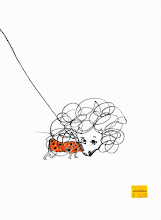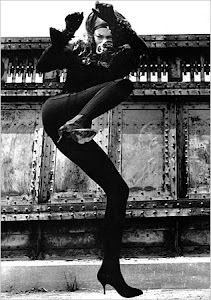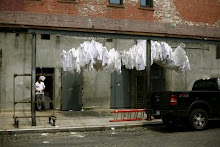I have never understood the term "the banality of evil". Having seen it, evil seems anything but banal; in fact, quite the opposite, creating a gushing, sickening wash of adrenalin that is perhaps addictive to some. That the perpetrators of real cruelty seem so casual about it might lead one to think that there is a banality to evil but even then the effect of the actions is so profound that their relative calm in the face of it seems to add to the horror. That one becomes inured to evil, or cruelty, is also nothing but a mask.
So why think about Hannah Arendt's apparently wise words now?
I have just watched, twice, a police interview almost exactly a year ago with serial rapist and killer Paul Bernardo. The police were questioning him about the 1990 disappearance and murder of Elizabeth Bain, as the man convicted of killing her, her boyfriend, has been freed by the courts and there is no one else around to take the blame.
Canada is a small country and once we have a star that star will serve for everything. Ralph Benmurgi is a TV personality of dubious merit who will always find a home somewhere on the CBC; you'd think only Margaret Atwood ever wrote a book and the poor woman is called upon for a quote about everything from what is "Canadian" (answer: a beer) to the weather; Anne Murray needs never record again and will still be our national songbird and we have the one good serial killer so let's let him fill in for every mystery remaining on the books.
Bernardo, I had been told by insiders, had gone to fat in the dungeon-like prison he will die in but that's not true -- the interview, broadcast today on national television, shows a man who looks somehow younger than he did at trial as though there is a picture in an attic somewhere growing more haggard and wrinkly by the day; he is thin as to seem delicate. I didn't cover all of his trial and so only heard his voice on tape as he was raping young girls, when there was a barely contained joy in it, and that joy was chilling. In the tape of his interview his voice is light, airy, slightly whiny, hardly scary at all except in its somewhat flat tone and weirdly feminine quality. He looks not like a vicious, sadistic torturer, rapist and slow murderer but rather like a guy who'd be beaten in the schoolyard just 'cause.
Is that what the banality of evil means? I don't find it that at all. He is terrifying for being so easily hidden, he really can pass for one of us. For a nothing-to-be-scared of less-than-us in fact.
I interviewed his last rape victim who lived, if living can be what you'd call it. She was nearly dead from the attack and police told me that they were convinced that whoever did this to her would murder the next victim, her injuries were such that their guess was he was scared off somehow. She spent the next weeks and months shattered, unable to leave her home, sleeping curled at the end of her parents' bed like a frightened dog. How did it happen that she was raped? She knew there was a rapist afoot in her neighborhood when she got off the bus late that night, someone got off right behind her. She turned around, scared, and saw Bernardo and thought "whew, I'm okay." THAT's how mild he looks.
Having heard the interview I would have to say I have no idea at all if he was lying or not. He didn't admit to abducting and killing Elizabeth Bain, a young university student who vanished one sunny afternoon and whose body has never been recovered. He seemed to have little interest in what was being asked of him and the police seemed to have little interest in asking it -- you have never seen or heard anything as deeply boring as a real police interview. I suspect they save the good stuff for when the recording machines are turned off. Given that he will live for the rest of his days in a 5x8 ft. cement box you would think he'd be willing to trade information on where her body can be found for cable TV or a lakeside view -- the dungeon he lives in is on the shores of Lake Ontario -- but it seems no such deal was offered. If he killed Bain he couldn't be assed to say so, and he couldn't be assed to deny it very vehemently. Why should he do either? Nothing much changes in his world and her parents' torment about simply not knowing what happened to her would matter not and nought.
Bernardo seems utterly harmless and yet is capable of unspeakable acts. The court artist who drew him daily during his trial suggested maybe he raped and then killed and then tortured-and-killed in an escalating madness simply so he could feel .... SOMETHING, to be relieved of the bland dullness to which an unfeeling psychopath is sentenced. So how perfect that his criminal sentence was not execution, but life -- actual life, not criminal justice life, he will never be released from prison in a small blank cell to the end of his endless days -- he has been sentenced to utter boredom. The worst and only torture for someone like him.
I think my own understanding of the banality of evil must be in this flat affect, that the only one who suffers is the victim and those around the victim, that the perpetrator apparently moves on to live much as he did before. Maybe in a nice flat somewhere, maybe in a prison cell. Maybe it doesn't matter. Evil only matters to the victim, the perpetrator will never hurt. He can't be made to hurt, he doesn't have the stuff. Victims of casual cruelty will suffer the more for this. Their pain cannot possibly be answered.
The living rape victims and the parents of the dead girls must be driven insane by thoughts of what Bernardo has done and what he has destroyed, and I liked the idea that Bernardo was sentenced to boredom, it seemed Biblically fitting, it seemed like it would really get to him, really drive him equally mad. But there is no justice. The calm and casual guy the police interviewed that day seems just fine. He is in prison, sure. He really doesn't seem to mind much.
Tuesday, June 10, 2008
Sunday, June 8, 2008
On Hillary
The weekend papers are filled with "what she did wrong" stories and analysis but the best words that say the most about Hillary Clinton are Hillary's own.
In true Clinton tradition, her final going away speech seems to have been tear-jerking, memorable, historic. The NYT reports that "For 28 minutes, standing alone on a stage in the historic National Building Museum, Mrs. Clinton spoke not only about the importance of electing Mr. Obama, but also about the extent to which her campaign was a milestone for women. She urged women had supported her -- who had turned out at her headquarters, flocked to her rallies and poured into the polls to vote for her -- not to take the wrong lesson from her loss.
" "You can be so proud that from now on, it will be unremarkable for a woman to win primary state victories, unremarkable to have a woman in a close race to be our nominee, unremarkable to think that a woman can be the president of the United States....To those who are disappointed that we couldn't go all of the way, especially the young people who put so much into this campaign, it would break my heart if, in falling short of my goal, I in any way discouraged any of you from pursuing yours."
"At that point the cheers, mostly from women, swelled so loud that Mrs. Clinton's remaining words could not be heard."
That is an elegant bit of reporting and if you think it's easy to pull off in the heat of such a moment, it isn't. But more than that, what an elegant speech. Obama did himself proud as well, in being respectful to Hillary for her role in inspiring his own young daughters.
History will tell, but it seems that Hillary's team failed to fully understand the effect of online to influence people and to drive community, a movement. Much as historians now say the dramatic shift that swept JFK to power was his ability to intuit the power of television while Nixon did not, this may be the great learning and deeper understanding we are to have about the media age we now live in. More traditionally, it seemed to me that Hillary could not win for losing -- that the candidates were neck-and-neck but it was spelled as her failure and her loss, not his failure to gain a greater groundswell if he was so damn popular. Maybe that's the rub when you were a front-runner. She seemed to play an old-fashioned political game of pulling in chips, playing hardball with her opponent and risking "bitch", of being a down and dirty. We are told now that this was the tone of the Clinton years and it is out of fashion now. Who knows what went on in the backrooms at Club Obama. He seemed to be able to keep the weather sunnier, regardless of what may become the truth.
Obama became a master showman, his early tentative and timid tone now replaced with glorious presidential (at least as far as we see in movies) rhetoric. Maybe that's all a president needs to be, much as that is all (I think) a Queen needs to be. Stand for something, give the people something to believe in, stir their flagging hope. After that, doesn't much matter what you do. Maybe you shouldn't go to war unless it's really, really clear you need to. Aside from that, being president might be the easiest job in the world.
We love Bill Clinton, and why? Because he spoke so well. Seemed so charming. We forgave him everything including ....what did he do for a living again?
How perfect that he now makes his living....speaking. Play your best game, that's the message.
For all the talk of "change", ironically, Obama seems very Clinton-ish, with his warm wash of wonderful words. We may have seen Obama's best game. I don't think we've seen Hillary's. And right now, that seems a pity.
In true Clinton tradition, her final going away speech seems to have been tear-jerking, memorable, historic. The NYT reports that "For 28 minutes, standing alone on a stage in the historic National Building Museum, Mrs. Clinton spoke not only about the importance of electing Mr. Obama, but also about the extent to which her campaign was a milestone for women. She urged women had supported her -- who had turned out at her headquarters, flocked to her rallies and poured into the polls to vote for her -- not to take the wrong lesson from her loss.
" "You can be so proud that from now on, it will be unremarkable for a woman to win primary state victories, unremarkable to have a woman in a close race to be our nominee, unremarkable to think that a woman can be the president of the United States....To those who are disappointed that we couldn't go all of the way, especially the young people who put so much into this campaign, it would break my heart if, in falling short of my goal, I in any way discouraged any of you from pursuing yours."
"At that point the cheers, mostly from women, swelled so loud that Mrs. Clinton's remaining words could not be heard."
That is an elegant bit of reporting and if you think it's easy to pull off in the heat of such a moment, it isn't. But more than that, what an elegant speech. Obama did himself proud as well, in being respectful to Hillary for her role in inspiring his own young daughters.
History will tell, but it seems that Hillary's team failed to fully understand the effect of online to influence people and to drive community, a movement. Much as historians now say the dramatic shift that swept JFK to power was his ability to intuit the power of television while Nixon did not, this may be the great learning and deeper understanding we are to have about the media age we now live in. More traditionally, it seemed to me that Hillary could not win for losing -- that the candidates were neck-and-neck but it was spelled as her failure and her loss, not his failure to gain a greater groundswell if he was so damn popular. Maybe that's the rub when you were a front-runner. She seemed to play an old-fashioned political game of pulling in chips, playing hardball with her opponent and risking "bitch", of being a down and dirty. We are told now that this was the tone of the Clinton years and it is out of fashion now. Who knows what went on in the backrooms at Club Obama. He seemed to be able to keep the weather sunnier, regardless of what may become the truth.
Obama became a master showman, his early tentative and timid tone now replaced with glorious presidential (at least as far as we see in movies) rhetoric. Maybe that's all a president needs to be, much as that is all (I think) a Queen needs to be. Stand for something, give the people something to believe in, stir their flagging hope. After that, doesn't much matter what you do. Maybe you shouldn't go to war unless it's really, really clear you need to. Aside from that, being president might be the easiest job in the world.
We love Bill Clinton, and why? Because he spoke so well. Seemed so charming. We forgave him everything including ....what did he do for a living again?
How perfect that he now makes his living....speaking. Play your best game, that's the message.
For all the talk of "change", ironically, Obama seems very Clinton-ish, with his warm wash of wonderful words. We may have seen Obama's best game. I don't think we've seen Hillary's. And right now, that seems a pity.
Sunday, June 1, 2008
Sex and the City
Boys have their toys plus Matrix, Die Hard, James Bond and Val Kilmer films. Girls have Sex and the City.
Who would have thought that a so-so column in a so-so newspaper would become a so-so book would become a blockbuster mass movement?
During my more annoying or pathetic jags my brother will call and say "Hi Carrie, is Samantha there?" in an attempt to conjure a more cheerio my deario attitude, to help me get my groove back. My brother lives in a tiny town in the middle of the bald open prairie -- that he, a man's man in a remote empty wilderness not only knows that there is a Carrie and a Samantha but can articulate their relative merits and differences shows just how deeply the friends from NYC have permeated the culture.
Millions of words have been written about the SATC movie launched last week -- apparently most tickets are being purchased in groups, a sure sign that girls and their girlfriends are flocking; Cosmo parties are held in theatre lobbies; even a group of breast cancer survivors added seeing the flick to the panapoly of things they bond over, as reported in the New York Times.
Critics suggest that the movie isn't that good, which seems to be missing the point of it. The movie exists because there is not a woman in North America who can't identify which of the four friends she most resembles. The series itself was not much more than a fantastic cartoon that somehow wiggled its way into resonating with the way women really live, or would really like to live, in all life's messy glory. As television, SATC dared to show women as both venal or silly and at the same time deeply loyal at least to each other -- as caricatures they managed to be more nuanced than a lot of other versions on a lot of other shows. The fab four were both decent and shallow, they fought and made up, they drank too much and swore far too much, had sex with deeply inappropriate men and were as non-committal in relationships as men appear to be. In the early going someone wrote that SATC was not actually about girlfriends at all but rather about four gay men or more accurately, four big queens. Over time, what made them hugely appealing was that not one of them was good or bad, they were flawed just like real people but they had one huge dreamy advantage over the rest of us -- they had each other, through thick or thin. They didn't have to put their eggs in a relationship basket, each had THREE strong people in their corner at all times.
That bond of friendship is the real appeal, because it's so wonderful to contemplate and so rare. Years ago, when I was suffering my first huge heartbreak a friend -- a guy -- looked at my tear-dripping face and said simply "You need some good girlfriends." He was so right! and yet good girlfriends, or friends period, are hard to find. Twice in my life great friends, colleagues I worked with for years, turned out to be about proximity; once we were no longer in each other's faces, quite literally by means of workspace, I saw little of them. Girlfriends come and go with the vagaries of boyfriends and husbands and babies and soccer to attend to; there is almost always something a bit more important than getting together with your gal pals. So the luxury displayed weekly on SATC, TV version, was not so much the Manolos or the thousand-dollar t-shirts, the luxury was the solid footing each woman had with the others. Carrie, Samantha, Miranda and Charlotte each knew she could call at 3am and the others would rally, she could count on the others to show up for brunch, she could count on her friends to both celebrate with her and save her as the moment required.
The movie may have messed with this essential DNA a bit, rendering the girls a little less distinct -- one criticism is that in the film they've even started to dress alike -- but the groundswell of grassroots approval shows that real live women, grown ups, weren't ready to say goodbye to their fake friends. Perhaps the series and the movie also stand as a template for creating better real ones.
Who would have thought that a so-so column in a so-so newspaper would become a so-so book would become a blockbuster mass movement?
During my more annoying or pathetic jags my brother will call and say "Hi Carrie, is Samantha there?" in an attempt to conjure a more cheerio my deario attitude, to help me get my groove back. My brother lives in a tiny town in the middle of the bald open prairie -- that he, a man's man in a remote empty wilderness not only knows that there is a Carrie and a Samantha but can articulate their relative merits and differences shows just how deeply the friends from NYC have permeated the culture.
Millions of words have been written about the SATC movie launched last week -- apparently most tickets are being purchased in groups, a sure sign that girls and their girlfriends are flocking; Cosmo parties are held in theatre lobbies; even a group of breast cancer survivors added seeing the flick to the panapoly of things they bond over, as reported in the New York Times.
Critics suggest that the movie isn't that good, which seems to be missing the point of it. The movie exists because there is not a woman in North America who can't identify which of the four friends she most resembles. The series itself was not much more than a fantastic cartoon that somehow wiggled its way into resonating with the way women really live, or would really like to live, in all life's messy glory. As television, SATC dared to show women as both venal or silly and at the same time deeply loyal at least to each other -- as caricatures they managed to be more nuanced than a lot of other versions on a lot of other shows. The fab four were both decent and shallow, they fought and made up, they drank too much and swore far too much, had sex with deeply inappropriate men and were as non-committal in relationships as men appear to be. In the early going someone wrote that SATC was not actually about girlfriends at all but rather about four gay men or more accurately, four big queens. Over time, what made them hugely appealing was that not one of them was good or bad, they were flawed just like real people but they had one huge dreamy advantage over the rest of us -- they had each other, through thick or thin. They didn't have to put their eggs in a relationship basket, each had THREE strong people in their corner at all times.
That bond of friendship is the real appeal, because it's so wonderful to contemplate and so rare. Years ago, when I was suffering my first huge heartbreak a friend -- a guy -- looked at my tear-dripping face and said simply "You need some good girlfriends." He was so right! and yet good girlfriends, or friends period, are hard to find. Twice in my life great friends, colleagues I worked with for years, turned out to be about proximity; once we were no longer in each other's faces, quite literally by means of workspace, I saw little of them. Girlfriends come and go with the vagaries of boyfriends and husbands and babies and soccer to attend to; there is almost always something a bit more important than getting together with your gal pals. So the luxury displayed weekly on SATC, TV version, was not so much the Manolos or the thousand-dollar t-shirts, the luxury was the solid footing each woman had with the others. Carrie, Samantha, Miranda and Charlotte each knew she could call at 3am and the others would rally, she could count on the others to show up for brunch, she could count on her friends to both celebrate with her and save her as the moment required.
The movie may have messed with this essential DNA a bit, rendering the girls a little less distinct -- one criticism is that in the film they've even started to dress alike -- but the groundswell of grassroots approval shows that real live women, grown ups, weren't ready to say goodbye to their fake friends. Perhaps the series and the movie also stand as a template for creating better real ones.
Subscribe to:
Comments (Atom)











